 Every April, Dang celebrates what she calls “Freedom Day” — the anniversary of breaking away from a life of being sexually abused and trafficked. Since MSNBC aired the documentary Sex Slaves in America: Minh’s Story in 2010, Dang has become an unbending force in the fight to end the commercial sexual exploitation of children — helping many heal the pain and shame associated with it. She has courageously addressed tens of thousands of survivors, advocates, and other concerned citizens, as well as directed Don’t Sell Bodies, founded by actress Jada Pinkett Smith. Recognized by the White House in 2013 as a Champion of Change, Dang said, “There was a time that I could only imagine breathing beyond the next day, let alone being at the White House.” She credits her Berkeley undergraduate experience for teaching her how to “stand up for justice” and looks forward to April 16, 2026, when her “days in freedom will finally match my days in slavery.” The Cal Alumni Association honored Dang with the 2014 Mark Bingham Award for Excellence in Achievement by a Young Alumna. Read her blog Minh Speaks Truth, or follow her on Twitter @minhspeakstruth or Facebook.
Every April, Dang celebrates what she calls “Freedom Day” — the anniversary of breaking away from a life of being sexually abused and trafficked. Since MSNBC aired the documentary Sex Slaves in America: Minh’s Story in 2010, Dang has become an unbending force in the fight to end the commercial sexual exploitation of children — helping many heal the pain and shame associated with it. She has courageously addressed tens of thousands of survivors, advocates, and other concerned citizens, as well as directed Don’t Sell Bodies, founded by actress Jada Pinkett Smith. Recognized by the White House in 2013 as a Champion of Change, Dang said, “There was a time that I could only imagine breathing beyond the next day, let alone being at the White House.” She credits her Berkeley undergraduate experience for teaching her how to “stand up for justice” and looks forward to April 16, 2026, when her “days in freedom will finally match my days in slavery.” The Cal Alumni Association honored Dang with the 2014 Mark Bingham Award for Excellence in Achievement by a Young Alumna. Read her blog Minh Speaks Truth, or follow her on Twitter @minhspeakstruth or Facebook.
Author Archives: Amy Cranch
 Powers has a favorite story that goes like this: A professor fills a vat with rocks and asks his students if it’s full. Yes, they say. He repeats this process with pebbles, sand, and finally water. When asked what the moral is, the students say there’s always room for more. But the professor disagrees. If you want the big rocks to fit, you have to put them in first. As the University of Texas at Austin’s president since 2006, former dean of its law school, and one of the country’s foremost scholars in personal injury and product liability, Powers knows how to keep his eyes on the big rocks. As an administrator, he gets high marks for his efforts to reform the undergraduate curriculum, diversify the faculty and student body, and save public higher education in a state that is eagerly trying to cut it to the bone. As a legal consultant, he chaired the 2001 committee that wrote the now-definitive Powers Report on the ethical and fiscal demise of Enron Corp. The Cal Alumni Association named Powers its 2014 Alumnus of the Year. Reflecting on his time at Berkeley and his UT leadership, Powers said in a California magazine article, “That’s what these great universities do for people. Kids still show up and think they’re the ones who don’t belong. But they do belong. They show up and it changes their lives.”
Powers has a favorite story that goes like this: A professor fills a vat with rocks and asks his students if it’s full. Yes, they say. He repeats this process with pebbles, sand, and finally water. When asked what the moral is, the students say there’s always room for more. But the professor disagrees. If you want the big rocks to fit, you have to put them in first. As the University of Texas at Austin’s president since 2006, former dean of its law school, and one of the country’s foremost scholars in personal injury and product liability, Powers knows how to keep his eyes on the big rocks. As an administrator, he gets high marks for his efforts to reform the undergraduate curriculum, diversify the faculty and student body, and save public higher education in a state that is eagerly trying to cut it to the bone. As a legal consultant, he chaired the 2001 committee that wrote the now-definitive Powers Report on the ethical and fiscal demise of Enron Corp. The Cal Alumni Association named Powers its 2014 Alumnus of the Year. Reflecting on his time at Berkeley and his UT leadership, Powers said in a California magazine article, “That’s what these great universities do for people. Kids still show up and think they’re the ones who don’t belong. But they do belong. They show up and it changes their lives.”
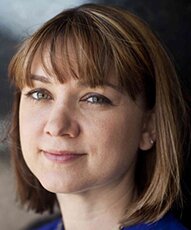 Keith, a National Public Radio (NPR) reporter, was so enthralled with the 1984 Summer Olympics as a four-year-old that she had an Olympics-themed birthday party later that year. When an NPR editor asked if she’d be interested in covering Sochi, she didn’t skip a beat. “I think I was chosen specifically because I’m not a sports reporter,” she said in a Q&A with Berkeley’s NewsCenter. “We (the reporters) like to have fun … and try to bring a sense of wonder to our stories.” Keith, who recently joined the White House beat after covering Congress for two years, admits that there is little in common between politics and sports. But whether it’s a fiscal battle or figure skating, one overarching narrative is “the fight for supremacy, the competition.” A self-proclaimed “radio nerd,” Keith launched her career as a student at Berkeley’s Graduate School of Journalism covering agriculture, the environment, and other topics for KQED’s California Report. She worked for several member stations before joining NPR in 2009. She also founded and created B-Side Radio, a long-running podcast that told stories you couldn’t hear elsewhere. When she’s not lobbing questions at Congresswomen, she’s fielding their fly balls for the Bad News Babes, a journalist softball team that plays Congresswomen to benefit breast cancer. Follow Keith on Twitter @tamarakeithNPR or her blog.
Keith, a National Public Radio (NPR) reporter, was so enthralled with the 1984 Summer Olympics as a four-year-old that she had an Olympics-themed birthday party later that year. When an NPR editor asked if she’d be interested in covering Sochi, she didn’t skip a beat. “I think I was chosen specifically because I’m not a sports reporter,” she said in a Q&A with Berkeley’s NewsCenter. “We (the reporters) like to have fun … and try to bring a sense of wonder to our stories.” Keith, who recently joined the White House beat after covering Congress for two years, admits that there is little in common between politics and sports. But whether it’s a fiscal battle or figure skating, one overarching narrative is “the fight for supremacy, the competition.” A self-proclaimed “radio nerd,” Keith launched her career as a student at Berkeley’s Graduate School of Journalism covering agriculture, the environment, and other topics for KQED’s California Report. She worked for several member stations before joining NPR in 2009. She also founded and created B-Side Radio, a long-running podcast that told stories you couldn’t hear elsewhere. When she’s not lobbing questions at Congresswomen, she’s fielding their fly balls for the Bad News Babes, a journalist softball team that plays Congresswomen to benefit breast cancer. Follow Keith on Twitter @tamarakeithNPR or her blog.
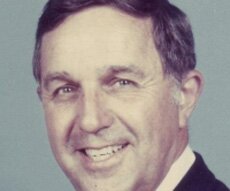 As the tune “Do-Re-Mi” from The Sound of Music concludes, “When you know the notes to sing, you can sing most anything.” That was certainly true for Brownson, a demonstrably kind man nicknamed “Howdy.” Once he learned his do-re-mis as a child, he didn’t stop singing in barbershop quartets, choruses, or church choirs until his death in 2013. A founder of the University of California Men’s Octet, Howdy was a treasured guest at every Octet reunion, where he enchanted younger alums with colorful tales of the old days and led them in Cal fight songs. In this rare video clip of Howdy singing with the Barbary Coasters, one of about 10 quartets he joined throughout his life, he said he wasn’t interested in serious competitions. “This is just for the hell of it. It’s good stuff.” That same motivation drove a passion for volunteering and traveling as well. He and his wife, Mary ’48, were generous lifelong supporters of Cal music and the Cal Alumni Association, and had a huge world map covered with pins marking where they had been. His advice to other travelers: “Just have fun. We go places for the going, not the getting there.”
As the tune “Do-Re-Mi” from The Sound of Music concludes, “When you know the notes to sing, you can sing most anything.” That was certainly true for Brownson, a demonstrably kind man nicknamed “Howdy.” Once he learned his do-re-mis as a child, he didn’t stop singing in barbershop quartets, choruses, or church choirs until his death in 2013. A founder of the University of California Men’s Octet, Howdy was a treasured guest at every Octet reunion, where he enchanted younger alums with colorful tales of the old days and led them in Cal fight songs. In this rare video clip of Howdy singing with the Barbary Coasters, one of about 10 quartets he joined throughout his life, he said he wasn’t interested in serious competitions. “This is just for the hell of it. It’s good stuff.” That same motivation drove a passion for volunteering and traveling as well. He and his wife, Mary ’48, were generous lifelong supporters of Cal music and the Cal Alumni Association, and had a huge world map covered with pins marking where they had been. His advice to other travelers: “Just have fun. We go places for the going, not the getting there.”
 A journalist, philosopher, and activist, Solnit refuses to be confined by anything but her own wildly roaming passions. The author of 13 books and countless essays, she has unraveled subjects as broad as punk, place, walking, ecology, and hope in the face of hopelessness. Her breakthrough book, River of Shadows, raked in the accolades for asserting that the seeds for both Hollywood and Silicon Valley were planted in 1878 when photographer Eadweard Muybridge proved that a Palo Alto racehorse’s hooves left the ground at once — foreshadowing modern cinema and cementing the peninsula as a hub of innovation. Her latest book, Unfathomable City, a companion to the bestselling Infinite City, weaves together brilliantly reinvented maps and essays that challenge our notions of New Orleans, a city defined as much by its crime, corruption, and disasters as it is by its colorful music, food, and cultural history. She said in an interview with Harper’s, “There is a kind of tragedy to all our lives, consisting of failures, of losses, of mortalities — but that sad landscape is salted with pleasures, with unions, with epiphanies and revelations … The trick is to hold both and maybe value both.” Find some of Solnit’s political essays on TomDispatch.com, or follow her on tumblr.
A journalist, philosopher, and activist, Solnit refuses to be confined by anything but her own wildly roaming passions. The author of 13 books and countless essays, she has unraveled subjects as broad as punk, place, walking, ecology, and hope in the face of hopelessness. Her breakthrough book, River of Shadows, raked in the accolades for asserting that the seeds for both Hollywood and Silicon Valley were planted in 1878 when photographer Eadweard Muybridge proved that a Palo Alto racehorse’s hooves left the ground at once — foreshadowing modern cinema and cementing the peninsula as a hub of innovation. Her latest book, Unfathomable City, a companion to the bestselling Infinite City, weaves together brilliantly reinvented maps and essays that challenge our notions of New Orleans, a city defined as much by its crime, corruption, and disasters as it is by its colorful music, food, and cultural history. She said in an interview with Harper’s, “There is a kind of tragedy to all our lives, consisting of failures, of losses, of mortalities — but that sad landscape is salted with pleasures, with unions, with epiphanies and revelations … The trick is to hold both and maybe value both.” Find some of Solnit’s political essays on TomDispatch.com, or follow her on tumblr.
Public Service and Activism, Writing
 Awuah left his home in Ghana in 1985 with $50 in his pocket and a full scholarship to Swarthmore College. Today he is one of Africa’s most respected leaders. After rising through the ranks at Microsoft, the birth of his first child inspired him to shift his focus toward home — and the belief that higher education could revitalize a nation beset by poverty and corruption. He enrolled at Berkeley-Haas and turned an audacious idea to establish Africa’s first private liberal arts college into a student project. Founded in 2002, Ashesi University (which means “beginning”) has graduated more than 500 students and is setting its sights on expanding the academic program and recruiting more African students beyond Ghana. “There have been times when it has seemed like Mission Impossible, but magic is happening,” he said in the Berkeley-Haas magazine. Although Awuah told CNN that only 5 percent of Ghana’s children go to college, he is courageously developing a generation of ethical, entrepreneurial leaders who will one day run the country. Follow him on Twitter @PatrickAwuahJr.
Awuah left his home in Ghana in 1985 with $50 in his pocket and a full scholarship to Swarthmore College. Today he is one of Africa’s most respected leaders. After rising through the ranks at Microsoft, the birth of his first child inspired him to shift his focus toward home — and the belief that higher education could revitalize a nation beset by poverty and corruption. He enrolled at Berkeley-Haas and turned an audacious idea to establish Africa’s first private liberal arts college into a student project. Founded in 2002, Ashesi University (which means “beginning”) has graduated more than 500 students and is setting its sights on expanding the academic program and recruiting more African students beyond Ghana. “There have been times when it has seemed like Mission Impossible, but magic is happening,” he said in the Berkeley-Haas magazine. Although Awuah told CNN that only 5 percent of Ghana’s children go to college, he is courageously developing a generation of ethical, entrepreneurial leaders who will one day run the country. Follow him on Twitter @PatrickAwuahJr.
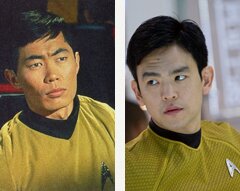 Both George Takei (left) and John Cho ’96 (right) played Hikaru Sulu, helmsman of the USS Enterprise, on Star Trek about 40 years apart. Takei founded the role on the original 1960s TV series, starring in three seasons and reprising the character in six movies and several video games. Cho played the highly sought-after role of Mr. Sulu in the 2009 and 2013 Star Trek films. As part of the Promise for Education campaign to raise money for University of California scholarships, Cho said he would “take a randomly selected fan that contributes at least $25 to a special lunch with George Takei and yours truly.” Find Takei on Facebook and Twitter @GeorgeTakei. Follow Cho on Twitter @JohnTheCho.
Both George Takei (left) and John Cho ’96 (right) played Hikaru Sulu, helmsman of the USS Enterprise, on Star Trek about 40 years apart. Takei founded the role on the original 1960s TV series, starring in three seasons and reprising the character in six movies and several video games. Cho played the highly sought-after role of Mr. Sulu in the 2009 and 2013 Star Trek films. As part of the Promise for Education campaign to raise money for University of California scholarships, Cho said he would “take a randomly selected fan that contributes at least $25 to a special lunch with George Takei and yours truly.” Find Takei on Facebook and Twitter @GeorgeTakei. Follow Cho on Twitter @JohnTheCho.
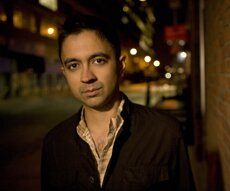 A 2013 winner of the MacArthur Foundation’s “genius” grant, Iyer, a jazz composer-pianist, is quickly ascending as a trendsetter through his eclectic mix of improvisation-based solo and ensemble compositions, cross-genre collaborations, and research on listening. Although Iyer, who holds a Ph.D. in the cognitive science of music, had planned on a career in the sciences, “Little by little I found myself pulled into a community of artists that valued the history and the aliveness of jazz,” he said in a video. Counting the classical music of his South Indian heritage, West African drumming, and African American masters such as Duke Ellington and Thelonious Monk among many influences, Iyer creates imaginative, rhythmic — even disorienting — works. While Accelerando features his superb trio and topped charts worldwide with its accessible experimentalism, his latest project, Holding It Down, is a collaboration with poet Mike Ladd that focuses on the experiences and dreams, from the mundane to the harrowing, of veterans of color who have served in Iraq and Afghanistan. Follow Iyer on Facebook or Twitter @vijayiyer.
A 2013 winner of the MacArthur Foundation’s “genius” grant, Iyer, a jazz composer-pianist, is quickly ascending as a trendsetter through his eclectic mix of improvisation-based solo and ensemble compositions, cross-genre collaborations, and research on listening. Although Iyer, who holds a Ph.D. in the cognitive science of music, had planned on a career in the sciences, “Little by little I found myself pulled into a community of artists that valued the history and the aliveness of jazz,” he said in a video. Counting the classical music of his South Indian heritage, West African drumming, and African American masters such as Duke Ellington and Thelonious Monk among many influences, Iyer creates imaginative, rhythmic — even disorienting — works. While Accelerando features his superb trio and topped charts worldwide with its accessible experimentalism, his latest project, Holding It Down, is a collaboration with poet Mike Ladd that focuses on the experiences and dreams, from the mundane to the harrowing, of veterans of color who have served in Iraq and Afghanistan. Follow Iyer on Facebook or Twitter @vijayiyer.
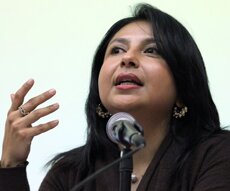 An unapologetic fan of Bono, Roy is a bit of a rock star herself. A professor of city and regional planning at Berkeley, she is a mighty voice behind connecting students’ passion for service to the skills and fieldwork experience they need to help alleviate global poverty. The global poverty and practice minor — which she founded through the new Blum Center for Developing Economies — is now a top minor. More than 450 students have graduated since 2007, and more than 4,000 students have taken her class on poverty and inequality. Today Roy is leading the #GlobalPOV Project, a groundbreaking teaching experiment that uses Twitter and artful, provocative videos on YouTube to heighten the conversation around this seemingly insoluble problem. The videos steer clear of two extremes: “the hubris of benevolence, young Americans thinking ‘I’m going to solve poverty during my alternative spring break,’ and the paralysis of cynicism.” Students honored Roy with the Golden Apple Award in 2008. One nomination said, “At the end of every lecture, you leave contemplating … the meaning of life and the world around us.” Follow Roy on Twitter @AnanyaRoy_Cal.
An unapologetic fan of Bono, Roy is a bit of a rock star herself. A professor of city and regional planning at Berkeley, she is a mighty voice behind connecting students’ passion for service to the skills and fieldwork experience they need to help alleviate global poverty. The global poverty and practice minor — which she founded through the new Blum Center for Developing Economies — is now a top minor. More than 450 students have graduated since 2007, and more than 4,000 students have taken her class on poverty and inequality. Today Roy is leading the #GlobalPOV Project, a groundbreaking teaching experiment that uses Twitter and artful, provocative videos on YouTube to heighten the conversation around this seemingly insoluble problem. The videos steer clear of two extremes: “the hubris of benevolence, young Americans thinking ‘I’m going to solve poverty during my alternative spring break,’ and the paralysis of cynicism.” Students honored Roy with the Golden Apple Award in 2008. One nomination said, “At the end of every lecture, you leave contemplating … the meaning of life and the world around us.” Follow Roy on Twitter @AnanyaRoy_Cal.
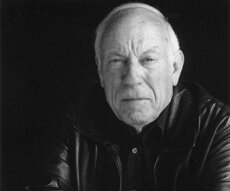 As a former history professor at Berkeley, Litwack did more than recite facts and figures. He dramatically brought his subjects to life with quotations, photos, and popular music as he guided more than 30,000 students through American history during a 43-year career. Litwack drew from the experiences of his Russian-born parents and immigrant neighbors to develop his own fascination with African American history, particularly the consequences of slavery. Even as a teen he confronted what he called “distortions and racial biases” in the textbooks. He was later active in the civil rights and free speech movements and won the Pulitzer Prize in 1980 for his book Been in the Storm So Long. Despite his prestige, he insisted on teaching introductory courses and challenged his students “to stand in the shoes of those who came before us, to flesh out and give human meaning to abstractions about democracy, freedom, liberty, and opportunity.” When he received the student-driven Golden Apple Award for Outstanding Teaching in 2007, one student wrote in his nomination, “I can hardly find a moment to blink for fear I’ll miss something interesting.”
As a former history professor at Berkeley, Litwack did more than recite facts and figures. He dramatically brought his subjects to life with quotations, photos, and popular music as he guided more than 30,000 students through American history during a 43-year career. Litwack drew from the experiences of his Russian-born parents and immigrant neighbors to develop his own fascination with African American history, particularly the consequences of slavery. Even as a teen he confronted what he called “distortions and racial biases” in the textbooks. He was later active in the civil rights and free speech movements and won the Pulitzer Prize in 1980 for his book Been in the Storm So Long. Despite his prestige, he insisted on teaching introductory courses and challenged his students “to stand in the shoes of those who came before us, to flesh out and give human meaning to abstractions about democracy, freedom, liberty, and opportunity.” When he received the student-driven Golden Apple Award for Outstanding Teaching in 2007, one student wrote in his nomination, “I can hardly find a moment to blink for fear I’ll miss something interesting.”
